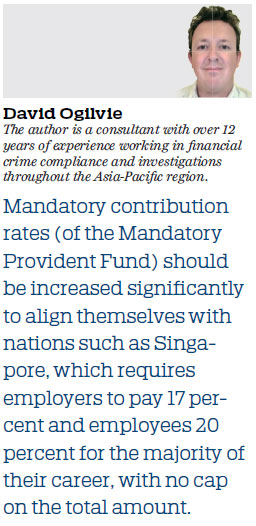SAR retirement program desperately needs reform
Updated: 2019-11-07 07:24
By David Ogilvie(HK Edition)
If, like many people, you dread your daily commute to the office from Monday to Friday, why on earth would you do it for longer than is absolutely necessary?
But for a lot of people reaching retirement age in Hong Kong, this prospect is fast becoming a reality. According to a survey by AIA earlier this year, up to 44 percent of respondents admitted that they do not have a systematic retirement savings and investment plan and only expect to start saving when they are 50 – only 11 years before their preferred retirement age. The survey concluded that up to 65 percent of workers face a shortfall of approximately HK$1.85 million ($236,000) each if they wish to retire at 61.
Making up for this shortfall will be no easy task. A 2018 report by pension provider Fidelity International stated that Hong Kong people need to save at least 12 times their annual salary if they wish to maintain their pre-retirement lifestyle once they reach 65. Given that the Mandatory Provident Fund, a compulsory pension plan for Hong Kong residents, requires employers and employees to each contribute just 5 percent of the individual’s salary at a cap of HK$3,000 a month, this would be a monumental task and, indeed, practically impossible even if individuals start contributing to the plan at age 20.

The consulting firm Mercer gave the MPF plan a C+ rating this year, just above the likes of developing-world economies such as Colombia and Indonesia, noting that while the plan has some “good features”, there are also some major shortcomings that put into question its long-term sustainability if they are not addressed in good time. Its efficacy as an investment vehicle is certainly in question following last year’s performance, when each MPF member lost on average HK$21,932 – a return of minus 8.21 percent – largely as a result of a 14 percent fall in Hong Kong’s stock market. Many would imagine that fund managers would lose their jobs with a wholly subpar performance like this, but they continue to accrue the same highly generous management fees irrespective of whether they make or lose money.
Since its introduction in 2000, the MPF has generated an annual return of about 4 percent after fees, outpacing yearly inflation of 1.8 percent but hardly setting the investment world on fire. This inadequate return has resulted in the average 60-to-64-year-old in Hong Kong holding a meager balance of HK$227,000 in their pension plans as of December 2017, according to the MPF Schemes Authority. For women, who in Hong Kong have a life expectancy six years longer than men, this figure drops to just HK$197,000. Elderly poverty rates in one of the richest cities in the world meanwhile continue to hover at just over 30 percent, double the rate of the overall population.
Government officials are keen for individuals to sign up to the authority’s annuity plan, but with an entrance fee of HK$3 million, this is clearly out of reach for many and does nothing for those who have little money to invest in a stable future. The regulatory authorities would moreover like us to take a more hands-on approach to managing our own pension plans, although with its administrative complexity and large choice of funds this is not an easy task for those with little or no investment experience – in other words, the majority of the population. Besides, individuals have very little leeway to manage their own investment choices under the plan due to its notorious rigidity.
Calls for something to be done about the MPF are getting louder. Many want investment education to become better available and for fund manager fees to be brought down through greater competition, as well as superior infrastructure that allows individuals to transfer funds or merge their accounts more easily. A greater selection of stocks and bonds with solid global ratings that could be invested in directly, thus bypassing management fees altogether, would also be welcome. Most importantly, mandatory contribution rates should be increased significantly to align themselves with nations such as Singapore, which requires employers to pay 17 percent and employees 20 percent for the majority of their career, with no cap on the total amount.
Some people will of course naturally want to remain in the workplace longer in order to keep mentally and physically active. There are certainly benefits to working beyond the retirement age, and it is important to note that loneliness can be curbed by work to an extent – although it’s also worth noting that many people in work feel deeply socially isolated as well.
For most, however, working beyond retirement is more a necessity than a choice. Like the rest of us, older people have been hit hard by the rise in living costs – particularly housing expenses – and many are now forced to keep working beyond their preferred retirement age in order to avoid falling into poverty. An inadequate pension plan only exacerbates this situation.
Rest and relaxation is beneficial for everyone, and ultimately the right to explore personal interests and spend more time with your family should be afforded to everyone after a lifetime of work, rather than be considered a luxury reserved just for the wealthiest among us.
(HK Edition 11/07/2019 page8)
